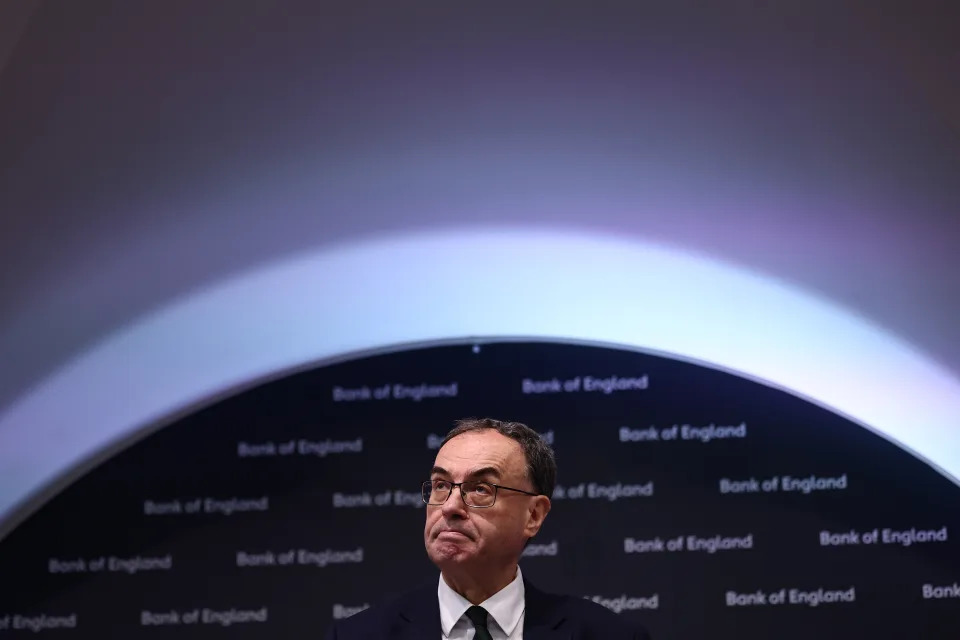Bank of England (BoE) governor Andrew Bailey is expected to say in a speech that the UK's economic growth situation is "not a good story", as he emphasises the need for investment to help drive its revival.
Bailey is set to make these comments in a speech at the annual Mansion House financial and professional services dinner later on Thursday evening.
The central bank chief will highlight how the UK's economic growth has continued to decline since the 2008 financial crisis and worsened since the onset of the pandemic in 2020.
"Bottom line — it’s not a good story," Bailey said in comments published ahead of the dinner.
According to BoE staff estimates, Bailey said that the average annual rate of growth of supply in the UK economy from 1990 to 2008 was 2.6%. Productivity contributed 2.2 percentage points (pp) to this figure, with 0.4pp coming from labour supply.
Read more: What does the launch of pension megafunds mean for investors?
Following the financial crisis, from 2009 to 2019, the average annual potential growth rate fell to 1.3%, of which 0.3% came from productivity and the other 1% from labour supply.
From 2020 to 2023, this potential growth rate then dipped to 0.7%, with productivity contributing 0.5% and labour supply 0.2%.
Bailey said that this showed the "main contributor" to the fall in the potential growth rate was weaker productivity growth, with the Covid pandemic a "major factor" in causing a further decline.
The comments come ahead of the release of third quarter UK economic growth data on Friday morning. The UK's gross domestic product (GDP), which measures economic growth, was estimated to have risen by 0.5% in the second quarter and was revised down from 0.6% .

Encouraging investment
To tackle this issue, Bailey is expected to stress the importance of investment in the UK.
"Productivity growth is linked to capital deepening — so it is linked to investment," he said in the pre-prepared remarks.
According to data from the Organisation for Economic Co-operation and Development (OECD), which shows investment as a share of GDP, he said that the UK was "almost continuously at the bottom of the G7 league table since the late 1990s".
"Looking over the last 10 years, business investment in the UK has been particularly weak by G7 standards," Bailey said.
"We need to encourage business investment in the UK."
Read more: What we know about planned UK private stock market Pisces
Bailey said he welcomed plans set out by chancellor Rachel Reeves in the recent autumn budget , with the focus on public capital investment.
In Labour's first budget in 14 years, Reeves announced a boost of more than £100bn in public investment over the next five years.
"The second big need for investment is the financial system being organised to supply capital," said Bailey, adding that the UK pension system is "too fragmented".
In her own Mansion House speech on Thursday evening, which is an annual address given by the current chancellor, Reeves is expected to reveal steps towards developing develop eight pension "megafunds" . This would come as part of reforms to Britain’s fragmented local government retirement scheme that she claims could unlock £80bn of investment.
Referring to this expected announcement, Bailey said: "It is, I am afraid, heavy lifting and a lot of it. You need and must have our support."
Labour supply and AI
Bailey is expected to highlight the impact of the UK's labour supply on economic growth, saying that the country's ageing population likely to be a "dominant influence" on this over the medium to long-term.
He will also highlight how different indicators were measured to determine economic growth.
Read more: UK wage growth barely slows, fuelling interest rate path uncertainty
"We probably are not measuring things properly — to some degree we never do or can, but we can’t fall back on measurement and assume the issue away," he said. "There are three main areas of measurement, and all of them have issues: the overall size of the economy; the amount of investment; and the labour force."
Bailey also discussed the importance of openness of the economy for potential supply.
"Openness to trade in goods and services affects productivity by facilitating competition, innovation and specialisation," he said.
And while Bailey reiterated that as a public official he took "no position on Brexit per se", the BoE governor said he did "have to point out consequences".
"The changing trading relationship with the EU has weighed on the level of potential supply," he said.
"The impact on trade seems to be more in goods than services, that is not particularly surprising to my mind. But it underlines why we must be alert to and welcome opportunities to rebuild relations while respecting the decision of the British people."
Read more: 7 post-budget steps to protect your finances
However, he said the focus on this area should not only be on the effects of Brexit but also on how this had now been "clouded by the impact of geopolitical shocks and the broader fragmentation of the world economy".
Bailey also addressed the question of whether AI could "ride to the rescue" and help solve the low level of potential supply.
"We are mostly experimenting with AI at the moment," he said. "There are strong grounds for optimism and of course risks to deal with, but AI isn’t an immediate magic solution."
The BoE announced its second interest rate cut this yea r last week, lowering its main rate by 0.25% to 4.75%.
However, Bailey cautioned that the central bank needed to make sure inflation stays close to its 2% target, saying it " can’t cut interest rates too quickly or by too much ".
This cautious tone, as well as wage growth data released on Tuesday, has fuelled uncertainty over the BoE rate cutting path, particularly as to whether it will cut rates again or keep them on hold in December.
Read more:
Apple and Android .

